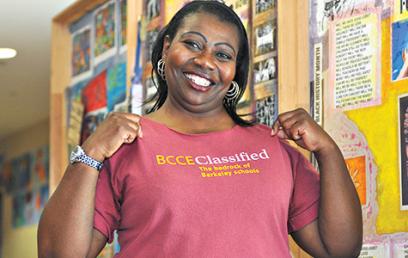Genia Scott
After-school educator
Berkeley (Calif.) Council of Classified Employees
That’s the experience of Genia Scott, an after-school educator who considers it her mission to bring “fair share” payers into the fold as members of the Berkeley (Calif.) Council of Classified Employees. Her co-workers sometimes think they’re members because money is deducted from their paychecks. That money isn’t dues, though. It’s a fee for their share of bargaining and administering their contract.
Scott is intensely proud of her job. Each day after school, she works mainly with kindergartners on colors and patterns by having them make lanyards and beadwork. She teaches them sequencing (first, second, third), the difference between uppercase and lowercase, how to tell time, and how to count by fives and 10s. Her job is about academic enrichment for all.
Scott takes her union role equally seriously. Although she understands why school employees might not want to sit in meetings, she is adamant about the importance of member engagement—at a minimum, knowing what’s in your contract and ensuring it’s applied fairly.
“You’ve got to come to the meetings,” she exhorts members. “That’s how you find out information.”
As a result of Scott’s engagement with fellow members and the union, her school has only one fee payer left among two dozen members. Scott is constantly enlisting new helpers, gauging their interest and readiness to lend a hand with the union. When another school doesn’t have a building rep, she “branches out” to help members there. In return, they show up for big meetings and rallies.
Not that it’s so easy for PSRPs to get involved. They have varied schedules—custodians and cafeteria staff get off at 2 p.m., while the rest leave later, up to 10:30 p.m. Some hold down other jobs, and some live an hour away. Turnover is high. Scott tries to catch them in the mornings, and if she stays late, she can reach almost everyone.
Partly, she is driven by curiosity. She makes it her business to know whether an instructional assistant or instructional tech is a temp or a permanent hire. She goes the extra mile to solve problems, in the course of which she learns the ins and outs of the union contract.
“If I’m not sure about something, I’ll call and find out,” she says. “I’m always asking and trying to clarify something.”
But mostly, she is driven by a sense of fairness—that contract provisions and procedures are there for a reason.
“If it’s right, it’s right. If it’s wrong, it’s wrong,” she says.
By building the strength of our union, Scott aims to make sure it’s right.

